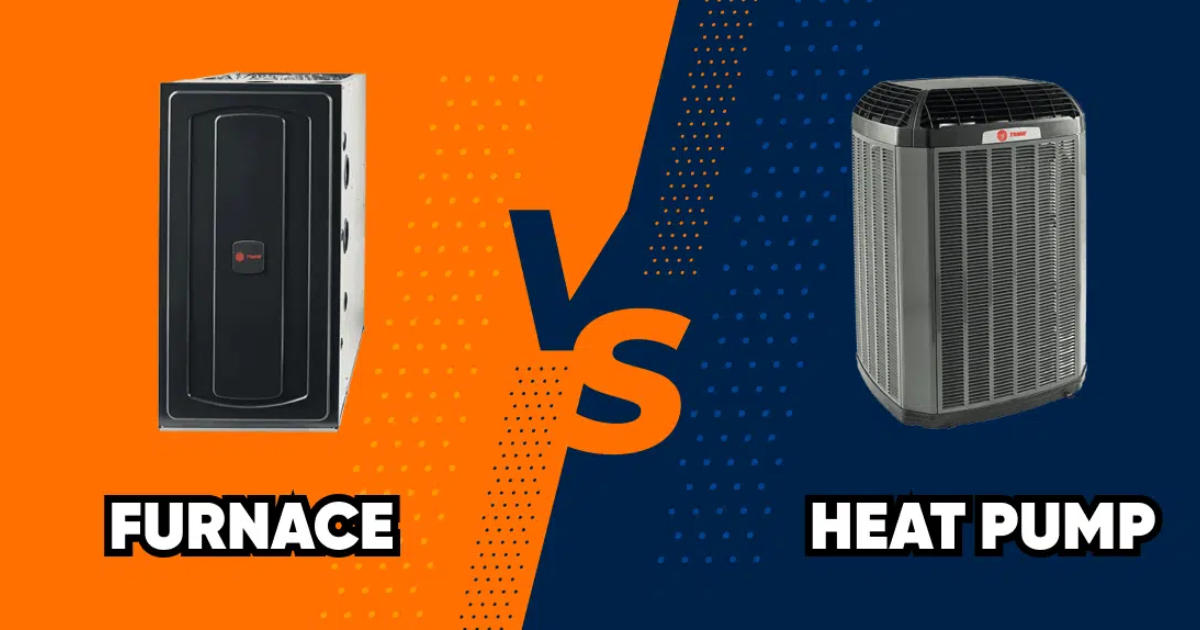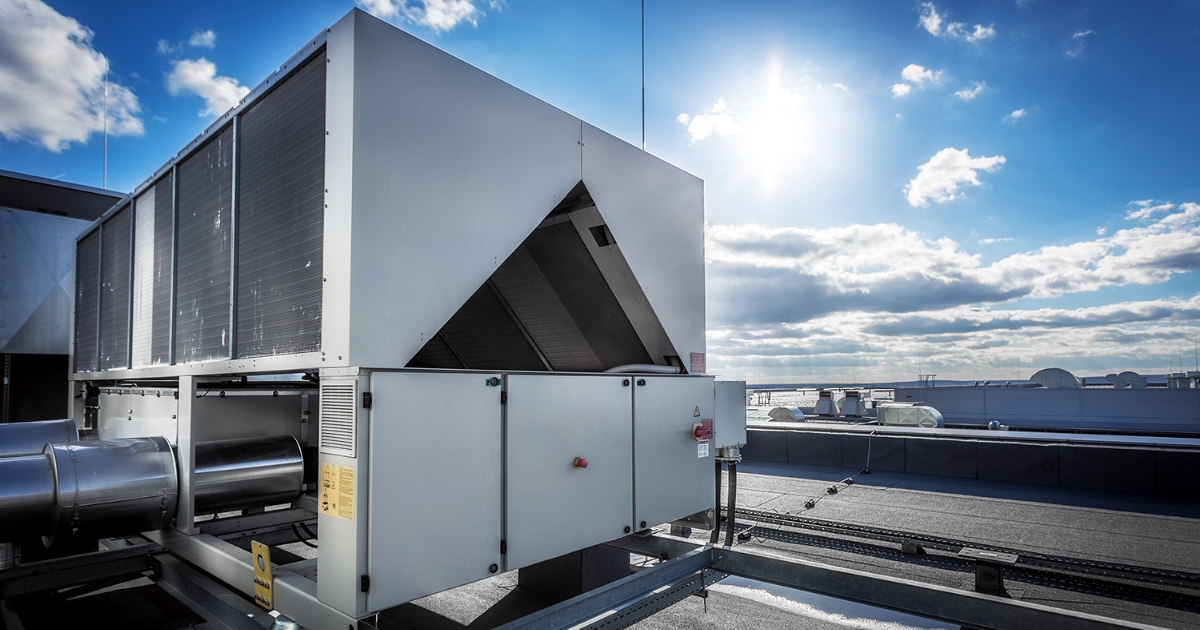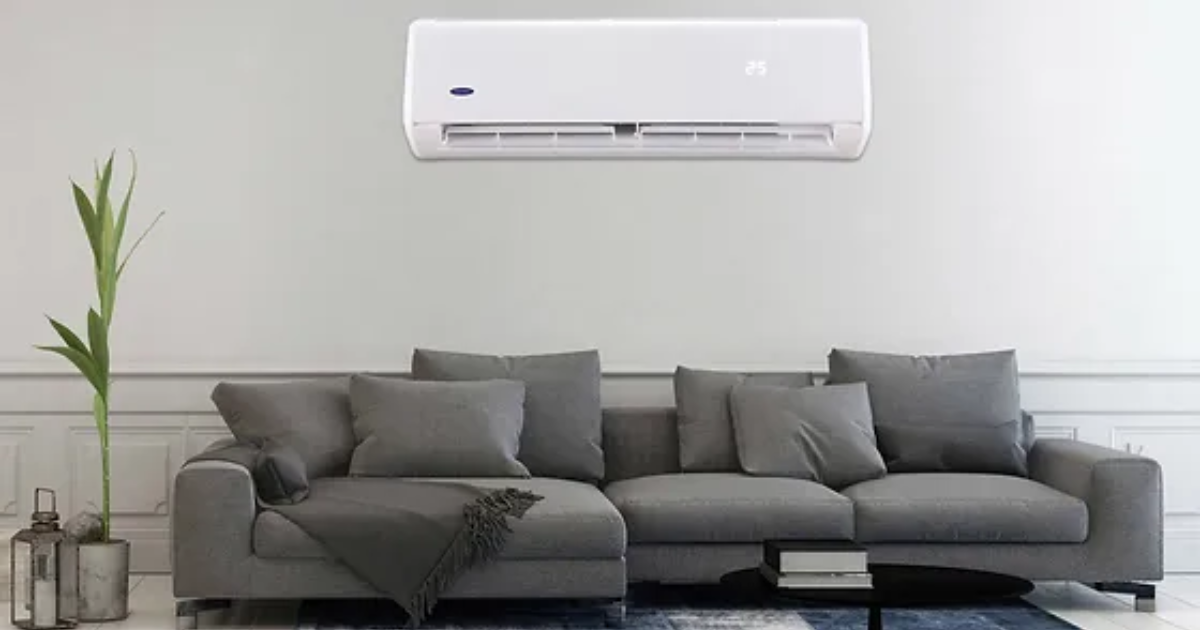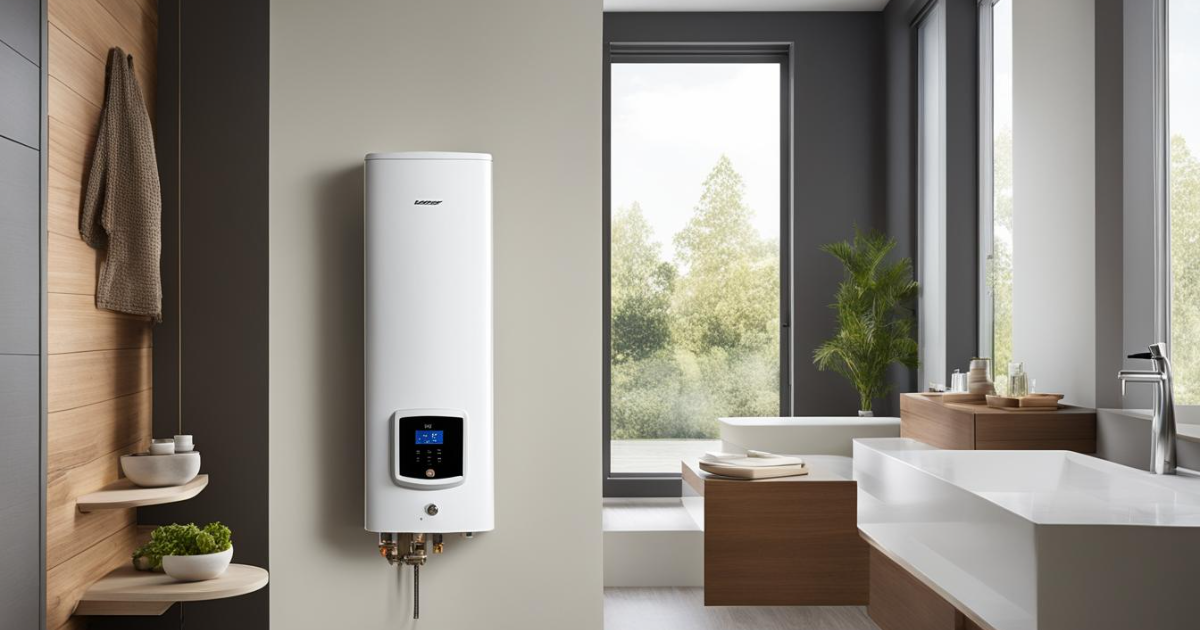Although furnaces and heat pumps both provide indoor heating, they vary in heating capabilities, energy efficiency, maintenance needs, space usage, and cost. These differences contribute to the ongoing fascination with the heat pump vs furnace debate. Homeowners often find themselves weighing the long-term savings of a heat pump against the typically lower upfront costs of a furnace. Additionally, the climate of the region can significantly influence the decision, as heat pumps are more effective in milder climates. Understanding these distinctions can help in making an informed choice that suits specific heating needs and budget considerations.
What Is a Heat Pump?
A heat pump is a system for heating and cooling that transfers heat from one place to another. It takes heat from the air outside, moves it to a liquid refrigerant, and then pumps it to a coil or heat exchanger inside the home’s ductwork. Air blows across the coil, heats up, and spreads through the home.
Interestingly, it doesn’t need to be warm outside for a heat pump to gather heat energy. These systems can work in temperatures below freezing, though they become less efficient. They can also remove heat from inside the home during warmer months, replacing it with cool, conditioned air. For those looking into different cooling options, air conditioners might be a suitable alternative.
What Is a Furnace?
A furnace is a forced hot air heating system connected to the home’s ductwork. It uses fuel oil, propane, natural gas, or electricity to heat a burner. The heat from the burner transfers to a heat exchanger, and a large fan blows air across it, creating heated air that spreads through the home to warm the rooms.
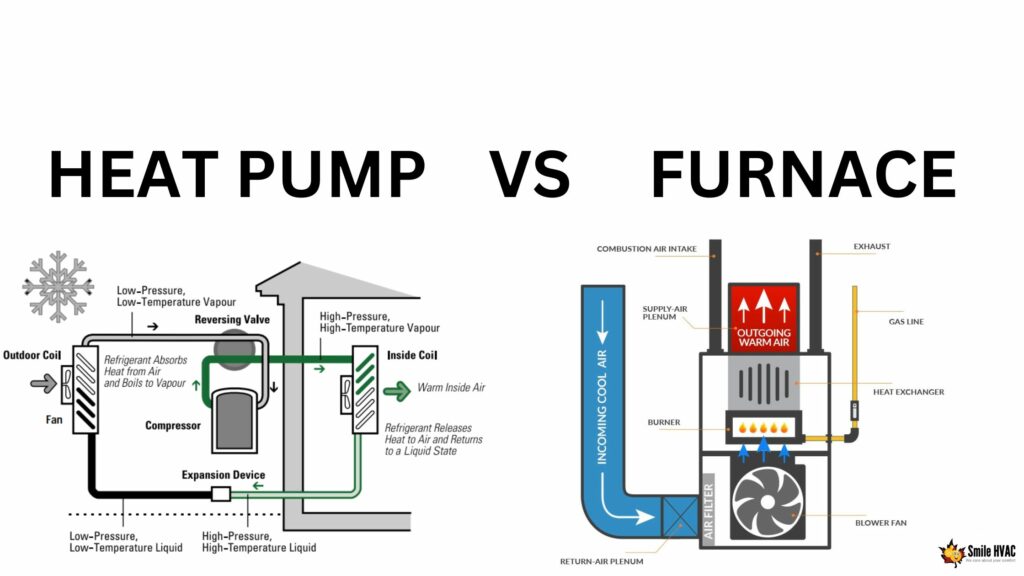
Source:smilehvac
Heat Pump vs. Furnace: Key Differences
Although their fundamental purposes are alike and they share some common components, these systems exhibit several notable differences. Here are some key points to consider in the comparison of heat pump vs furnace.
| Category | Heat Pump | Furnace | Read More |
| Cost | $3,500 – $4,500 depending on existing ductwork, system size, complexity, and type (air-to-air or geothermal). | $4,000 for electric, $4,500 for gas. Natural gas is more efficient but running gas lines can be costly. | Read More |
| Efficiency | Highly energy-efficient, using small amounts of electricity to move heat. Less efficient in very cold winters as they work harder to heat the home. | Creates its own heat using natural gas, propane, oil, or electricity. Better for colder climates. | Read More |
| Durability | Typically lasts about 15 years with regular maintenance; parts like pumps and refrigerants may need replacement. | Can last up to 20 years with proper maintenance. | Read More |
| DIY-Ability | Some models, especially mini-split units, can be DIY-friendly as they don’t connect to ductwork. | Installation should be done by professionals due to the complexity of fuel supply and exhaust systems. | Read More |
| Maintenance | More involved; keep pumps clear of ice and snow, remove debris, change air filters monthly, clean coils when dirty. | Minimal maintenance; regular filter changes, vacuuming inside the unit, and annual cleaning of the flame sensor. | Read More |
| Appearance | Requires a large unit outside the home and mini-splits inside, which can be unsightly. | Typically installed in basements, attics, or utility rooms, keeping them out of sight. | Read More |
Cost
- Heat Pump: The cost to install a heat pump ranges between $3,500 and $4,500. The price depends on whether ductwork already exists, the system’s size and complexity, and the type of heat pump. Air-to-air heat pumps, which gather heat from the air, are the simplest and cheapest but can be less efficient in cold climates. Geothermal heat pumps use underground pipes to take advantage of the Earth’s constant 50-degree temperature but are more expensive.
- Furnace: Installing a furnace costs between $4,000 for an electric furnace and $4,500 for a gas model. Natural gas is more efficient than electricity, but running gas lines can be costly, making electric furnaces more appealing in some cases.
Efficiency
- Heat Pump: Heat pumps use small amounts of electricity to move heat, making them very energy-efficient—up to a point. In very cold winters, they have to work harder to heat the home, making them less efficient compared to furnaces.
- Furnace: Furnaces create their own heat using natural gas, propane, oil, or electricity. Natural gas furnaces are the most efficient but still less efficient than heat pumps under normal conditions. However, because furnaces generate their own heat, they are better for colder climates.
Durability
- Heat Pump: Heat pumps usually last about 15 years with regular maintenance, although parts like pumps and refrigerants may need replacement.
- Furnace: Furnaces are simpler and can last up to 20 years with proper maintenance.
DIY-Ability
- Heat Pump: Some heat pumps can be DIY-friendly, especially mini-split units that don’t connect to ductwork.
- Furnace: Furnace installation should be done by professionals due to the complexity of the fuel supply and exhaust systems.
Maintenance
- Heat Pump: Maintenance is more involved than for furnaces but manageable. Homeowners should keep the pumps clear of ice and snow, remove debris, change air filters monthly, and clean the coils when dirty.
- Furnace: Furnace maintenance is minimal, mainly involving regular filter changes, vacuuming inside the unit, and cleaning the flame sensor annually. During maintenance, you can consider our Furnace Repair Service to ensure your system operates efficiently.
Appearance
- Heat Pump: Heat pumps often require a large unit outside the home and mini-splits inside, which can be unsightly.
- Furnace: Furnaces are usually installed in basements, attics, or utility rooms, keeping them out of sight.
Oil Furnace vs. Heat Pump
If you’re in an area where oil furnaces are common, the decision between an oil furnace and a heat pump is similar to choosing between a gas furnace and a heat pump. This highlights the common dilemma of a heat pump vs a furnace in such regions.
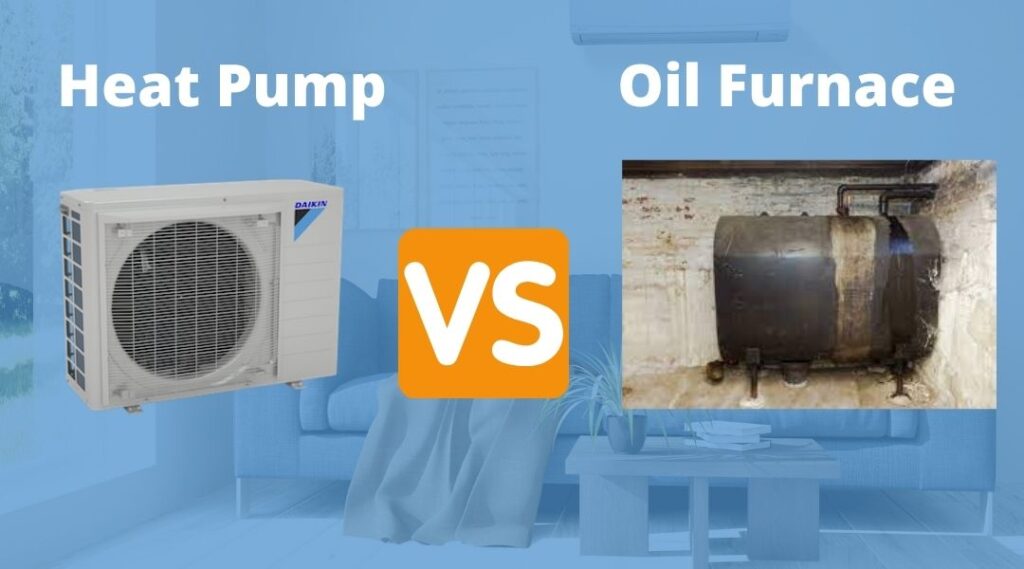
For oil furnaces, consider the installation costs. Heat pumps need an outdoor unit and an air handler. Also, compare the cost of heating oil with electricity. In mild climates, high-efficiency heat pumps can work well. In colder climates, oil furnaces might be more reliable, especially when temperatures drop below freezing.
With oil furnaces, make sure you don’t run out of oil. Heat pumps will keep running as long as there’s no power outage.
If you’re still undecided, your choice might come down to personal preference.
Heat Pump vs. Electric Furnace
When comparing electric furnaces and heat pumps, both use electricity to heat your home. They’re more common in southern states where winters are mild.
Electric furnaces use electric coils to generate heat, while heat pumps move heat from outside to inside. In colder climates, heat pumps often have a backup heat source, usually electric resistance heating coils.
Electric furnaces are 100% energy efficient but can be up to 2.5 times more expensive to run than heat pumps. Heat pumps also provide cooling, so you’ll need additional cooling solutions if you choose an electric furnace.
Heat Pump vs. Furnace: Which Is Best for You?
Choosing a heat pump vs furnace in Canada depends on your situation. Homeowners in warmer climates might prefer heat pumps for their efficiency and potential DIY installation. However, in colder climates like in Canada, particularly for those considering a heat pump vs a furnace in Ontario, a furnace might be better due to its efficiency in extreme cold and less visible installation. Keep these factors in mind when deciding which system suits your needs.
For commercial properties, addressing heating needs requires robust solutions tailored to larger spaces and higher usage demands. In these scenarios, exploring commercial comfort solutions can provide optimized heating and cooling strategies, ensuring efficient energy use and comfort throughout extensive facilities.
Conclusion
The decision between a heat pump vs. furnace hinges on various factors, including energy efficiency, initial cost, maintenance requirements, and climate suitability. Heat pumps offer long-term savings and are highly efficient in milder climates, while furnaces provide reliable heating in colder regions with typically lower upfront costs. By understanding these distinctions, homeowners can make an informed choice that aligns with their specific heating needs and budget considerations. Whether you’re also exploring options like tankless water heater rental, the debate of heat pump vs furnace remains a crucial consideration for those seeking the most effective and economical heating solution for their homes. Contact our expert for personalized advice tailored to your unique situation and heating requirements.

